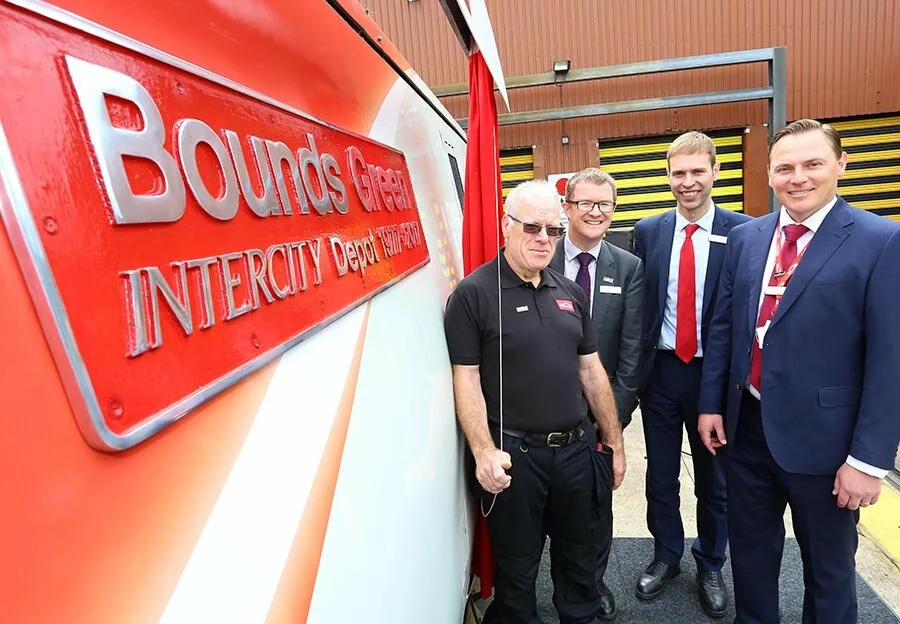- Home Page
- Fleet News Ramblings
- SKM News Views & Blog
- Behind The Picture
- Contact us
Stagecoach to take new Lake Sider open top on tour21/7/2017 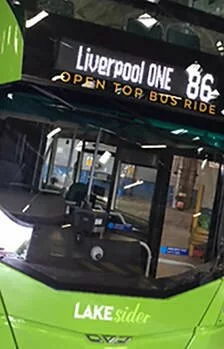
Bus companies have an ideal marketing tool. Their own vehicles. Some make good use of the resource whilst others alienate passengers, and prospective passengers, by mastering advertising and branding graphics over the windows.
Stagecoach Cumbria & North Lancashire has a fleet of new open top buses which carry a strong marketing message. And we hear the company is to make the most of its mobile marketing tool. Steven Knight Media hears that there will be a unique opportunity to photograph and travel on one of the new Volvo B5TL/WrightBus Gemini Lake Sider open top vehicles away from their normal operating area next week. The operation is to promote the Lake Sider services. The company has confirmed that one of the vehicles will be operating out in Manchester on Monday July 24th 2017, Liverpool on Tuesday July 25th 2017 and Preston on Wednesday July 26th 2017. On the Monday in Manchester it will see use in service on the 192, 203, 250 and X50 routes whilst on the Tuesday in Liverpool it will be used on services 82 & 86. In Preston on the Wednesday it will be used on service 2. The company says that this will be a unique one off opportunity to travel on and photograph one of these new vehicles in service outside of Cumbria. Stagecoach Cumbria Wright Gemini open tops to enter service this week.19/7/2017 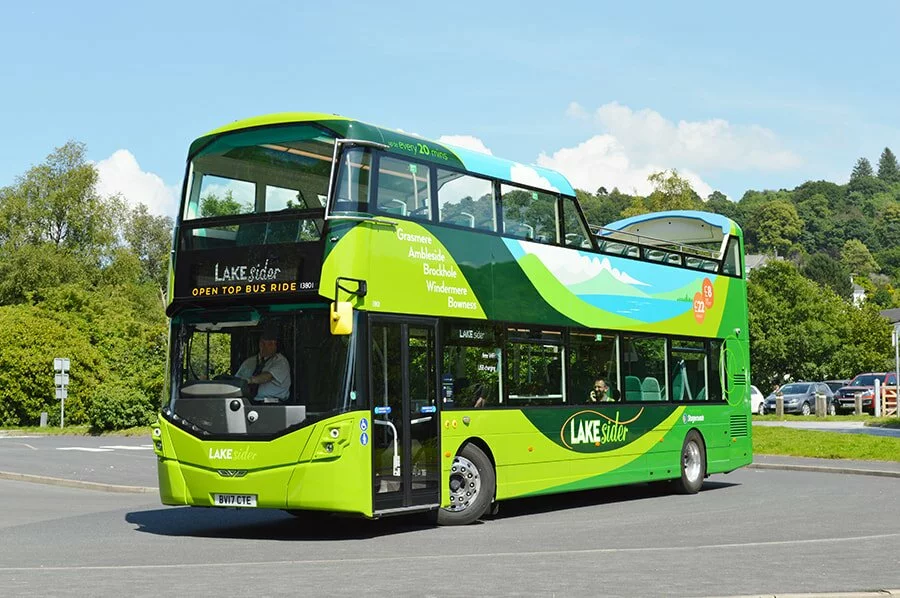 (c) Stagecoach Cumbria & North Lancashire (c) Stagecoach Cumbria & North Lancashire
Stagecoach Cumbria & North Lancashire Lake Sider branded Wright Gemini 3 bodied Volvo B5TL 13801 was pictured at Braithwaite Fold on July 18th whilst undergoing next stop audio announcement testing.
Seven Volvo B5TLs to part open top configuration, numbered 13801 – 13807, have been purchased to replace the fleet of former London-based Alexander ALX400 bodied Dennis Tridents that have been used on service 599 since 2009 from Kendal depot. The seven part-open top buses enter service during July and carry a new ‘Lake Sider’ livery from Best Impressions which replaces the current 599 ‘Lakes Connection’ livery. In a first for a Stagecoach regional fleet they have white LED destination screens with a full length destination screen, rather than just the route number, at the rear. They also feature next stop announcements and free Wifi. Stagecoach’s order marks a change in the policy of using older donor vehicles for its open top fleet. It is also a departure from its normal buying policy that tends to concentrate on ADL products. The displaced Dennis Tridents are due to move to other regional Stagecoach fleets in Scotland and the South East. 
Virgin Trains has named a Class 91 to mark 40 years of High Speed Trains (HST) at their Bounds Green depot. Class 91119 received its new name, ‘Bounds Green Intercity Depot 1977 -2017’, courtesy of engineer Steve Kirkup, who started at the depot back in 1977.
Bounds Green underwent major structural work in 1977 with the construction of Roads 9-14 at the depot in addition to a new yard in readiness for the HST which was set to transform the service along the east coast main line. Forty years on they are still an integral part of the Virgin Trains east coast fleet, although now based at Edinburgh’s Craignetinny depot, racking up close to 100,000 miles in a typical week, working alongside their stablemate the Class 91 to deliver more services than ever before. Widely regarded as one of the most successful train designs in the modern era, the HST will pass the baton on next year to the Azuma train, for the next exciting adventure in the route’s history with more frequent and faster services. But until then the HST will continue to delight customers and railway enthusiasts alike , its recent interior refresh as part of Virgin Trains £21m fleet revamp a big hit with passengers. Stagecoach to take new Plaxton Interurban coach in 201811/7/2017 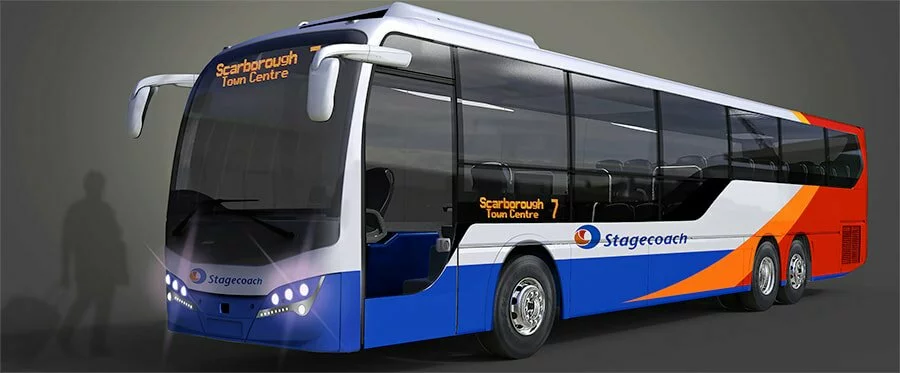 The Scarborough destination merely reflects the location of the Plaxton design studio and does not reflect where the vehicles may be based and operate. The Scarborough destination merely reflects the location of the Plaxton design studio and does not reflect where the vehicles may be based and operate.
Route One magazine has revealed that Stagecoach will take delivery of a new Interurban coach next year. The total vehicles on order is unknown but Steven Knight Media understands that delivery of the 14.5 metre tri-axle vehicles will take place in April 2018. It is not known where the vehicles be be allocated and where they will operate.\ The all-new coach is designed for interurban work, which in many cases is currently carried out by buses or high-floor coaches. It will have 53 seats. The chassis will be Volvo’s B8RLE Euro 6 and the Plaxton’s bodywork is to be based on the existing Leopard model. Route One magazine says that the low front provides access through a single door to a wheelchair bay and seats for less mobile passengers. The design, says Route One, bears some similarity to Wrightbus’ ‘commuter coach’, called the Eclipse Commuter, built on a version of Volvo’s B7RLE chassis with a higher floor section extended to the front axle. Intended for longer distance work, only five were built a decade ago, mostly for Stagecoach in Scotland. With the accessibility of coaches on inter-urban work an issue with the requirements to meet PSVAR, coupled with loading times and the inaccessibility of rural bus stops and most bus stations for conventional side lifts, it is thought this design will provide a better solution. Now train drivers union is in dispute with Virgin West Coast5/7/2017
We picked up a Tweet from train drivers union ASLEF at the weekend that said it is currently in dispute with Virgin Trains West Coast over the issue of pay.
ASLEF says that Virgin are claiming that the Department for Transport (DfT) is restricting what they are able to offer in the final year of a franchise. As far as I am aware it is normal practice for the DfT to clear any pay increases in the run up to re-franchising, a fact that ASLEF General Secretary Mick Wheelan acknowledges. So what is the issue here? Commenting on the situation ASLEF General Secretary Mick Whelan “I acknowledge that train operating companies are advised by the DfT to contain the overall costs of pay deals in the final year of franchises. However, I have a commitment in writing from a previous Secretary of State for Transport which states that if a pay award is linked to productivity, then it is a matter for the train company.” Mick added “ASLEF’s pay deal with Virgin Trains West coast is linked to productivity so the company should stop hiding behind the DfT and get back to the negotiating table with us.” Stagecoach woes at East Coast5/7/2017
News that Stagecoach is having to set aside £84.1m for losses at its’ East Coast rail franchise sets alarm bells ringing. The company says it is hoping to successfully renegotiate its East Coast rail franchise with the Department for Transport.
Stagecoach says it is negotiating the terms of its East Coast franchise with the DfT as a result of lower than expected revenue and profits against the original franchise agreement and what it says is uncertainty over Network Rail’s planned route upgrades. The hope is that Stagecoach will secure a franchise that from 2019 will give it a profit margin at least in line with that of a direct award franchise. So what has gone wrong. Neither Stagecoach or the Department for Transport is giving away much detail. Whilst the East Coast rail franchise has been seen as a must have at any cost by rail franchisees at least two - Sea Containers (GNER) and National Express - are aware that setting earnings expectations too high can mean that the business cannot be sustained. Let’s hope Stagecoach and its partners at Virgin are not heading that way. Stagecoach says it hopes to finalise new contract terms within the next year. Virgin launches on the day cheap fares and more...5/7/2017 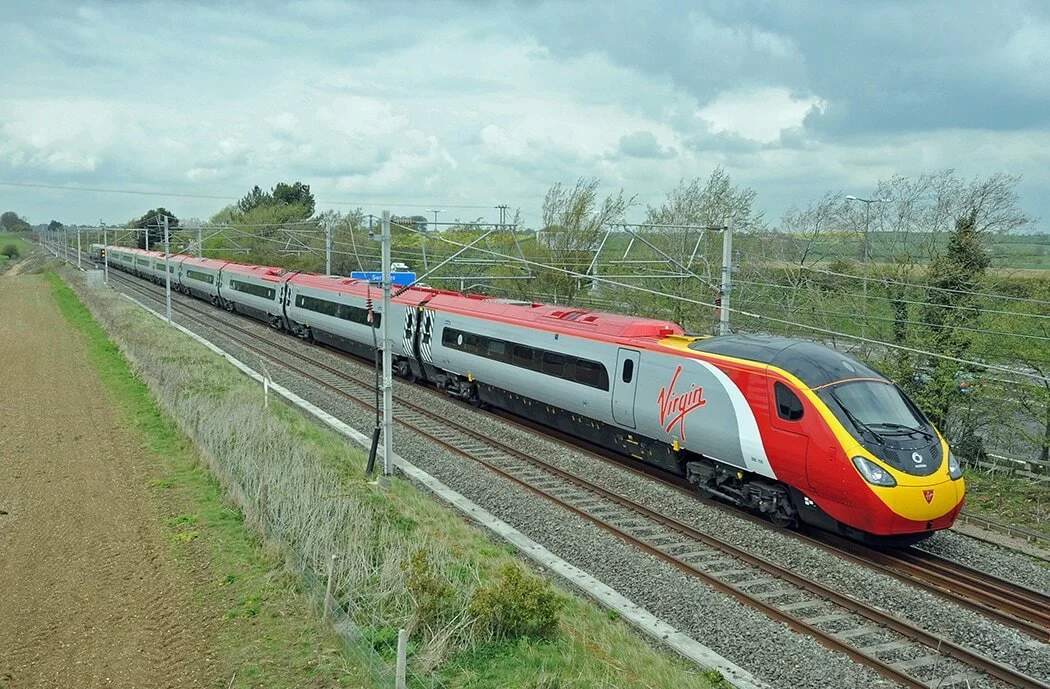 (c) Virgin Trains (c) Virgin Trains
Despite being in the final stages of its franchise, Virgin Rail Group continues to innovate on its West Coast franchise. Passengers are now being offered, subject to quota availability being available, advance priced fares on the day of travel. They will, like all Virgin West Coast’s advance fares, require a reservation. The on the day advance tickets can be booked up to one hour before the departure of the train from its origin station. The same day of travel advance ticket facility is also being introduced onto its East Coast route.
Changes to advance fare deadlines have also been introduced at other rail operators including Grand Central, Greater Anglia, Northern, TransPennine Express and Caledonian Sleeper with some offering the bargain priced tickets up to ten minutes before departure! Virgin estimates that based on the number of on-the-day fares currently bought by customers, Virgin Trains has calculated that the changes could save customers £15.5m a year. If that figure is right it means that £15.5m a year will also be wiped off Virgin West Coast’s bottom line, suggesting there is an agreement with the Department for Transport to protect the operator from heavy losses. The flip side is of course with cheaper tickets on offer more passengers may travel and revenues increase. These fares can be bought via Virgin Trains website, mobile app, at station ticket offices and other online retail channels including Trainline.com. Where they can take advantage of an advance fare, customers will also be able to reserve a seat when buying their ticket. Examples of savings include: An advance fare bought on the day for travel between Manchester or Liverpool and London could cost £37, saving customers 54% on the price of an off-peak single (£82.90); Customers travelling between Glasgow and London could buying a one-way ticket on the day could cost £65, less than half the price of an off-peak single (£136.60). Those travelling between Preston and London could pay £42 for a one-way ticket on the day, a 52% saving on the price of an off-peak single (£88.30). Virgin Trains has been leading the way in tackling fare complexity and ensuring a better deal for customers. The train operator confirmed earlier this year that is participating in a in a single-leg pricing trial with the Government which will consider alternative ways to guarantee customers simpler fares. That trial was due to start in May 2017 but a launch date is still awaited. Sarah Copley, Executive Director for Commercial at Virgin Trains on the West Coast said: “We’re really excited to be offering our customers more choice and great value fares on the day of travel. We have a strong record of innovating for the benefit of our customers, and our continued focus on giving them the best deal possible will mean that they could save up to fifteen million pounds “Customers can book advance tickets up to six months before travel on weekdays and three months on weekends, and this is still the best way to get the very cheapest fares. But we know some journeys are last-minute and that’s why we’re introducing advance fares that will be available on the day. Customers will not only get the cheapest possible fare, but they will also be able to reserve a seat for their journey, meaning they can make the most of their time on-board whether that’s relaxing or working.” In a separate promotion, Virgin will launch its 2017 Seat Sale on Thursday July 6th. One million discounted tickets will be available for West Coast travel between July 21st and December 8th although some travel restrictions apply. Tickets must be booked through virgintrains.com between July 6th and July 11th with fares starting at just £4. Discounted fares are available on First and Standard Class Advanced tickets, and include: London to Birmingham Standard Class, originally £8, now £5 London to Manchester Standard Class: originally £22, now £11 London to Glasgow Standard Class: originally £30, now £18 London to Manchester First Class: originally £45, now £30 London to Glasgow First Class: originally £55, now £37 London to Birmingham First Class: originally £26, now £17 Finally Virgin has confirmed that a fifth of its customers have switched to mobile-friendly digital tickets after their launch on the west coast route last summer. More than a 1.5 million digital tickets have been sold in the last three months alone, as customers respond positively to their simplicity and ease of use. Unlike traditional paper magstripe tickets, which have been an industry standard for 30 years, digital tickets can be easily downloaded to smartphone devices or printed at home and then scanned at automated ticket barriers. Between March and May, 18% of Virgin’s ticket sales were for digital tickets, a dramatic increase on a year earlier when this represented only one in 20 sales. |
Steven KnightSteven Knight is a Transport Specialist who has over 40 years experience in the bus and rail industries as well as in specialist transport journalism. He is a member of the Chartered Institute of Journalists. ArchivesJanuary 2021 |
 Create your own unique website with customizable templates.
Create your own unique website with customizable templates.
- Home Page
- Fleet News Ramblings
- SKM News Views & Blog
- Behind The Picture
- Contact us

